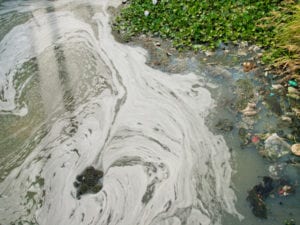Major long-term infrastructure plans are necessary, but South Africa also needs to take immediate action to overcome current water and waste management problems and looming crises.
This is according to industry experts helping inform the IFAT Africa trade show, to be staged in Johannesburg this year. Stakeholders across the water, wastewater and waste management sectors report growing frustration at the lack of progress in averting crises, despite years of discussion and planning. Pointing to critical failures in water and wastewater service delivery and a looming crisis in landfills and waste management in much of the country, experts say South Africa appears to lack the will to take real action. The experts emphasize that sustainable action plans must be implemented as a matter of urgency, with the government committing to enabling these plans, and independent regulators assigned to enforce their implementation. By moving now to address water and waste management problems, South Africa has an opportunity to delay or even avoid crises, and also to spark much-needed job creation in many sectors. Urgent action needed on Water Master Plan The National Water and Sanitation Master Plan, designed to guide the water sector with investment planning for the development of water resources and the delivery of water and sanitation services, does address key issues, but falls short in some respects – notably that it is built on outdated data, that the situation has changed since it was drafted, and that little or no progress has been made in implementing it, stakeholders say. They urged the government not to delay further, and instead of attempting a massive and costly effort to address all challenges at once, to immediately start rolling out ‘quick win’ initiatives. Independent regulators to oversee the environments would be key to overcoming the current challenges, they noted. “A plan without action is nothing really. If the goals of the water plan were achieved, we would see employment, empowerment, an improvement in the quality of water as a natural resource. But you need the political will and intent to start the process, and the funding will follow, says Wayne Taljaard, Managing Director at WEC Projects. Progress in the water and waste sectors are foundational to driving investment, economic progress and job creation, say stakeholders. Benoît Le Roy, Environmental, Technology & Project Alchemist, says: “Water is a fundamental economic enabler, so to attract investment you need to address the water challenges. A real problem is that all of our infrastructure is ageing, and by a decade ago our water reserve was 98% allocated. Investors know this and without water security, they won’t invest.” “Government at the national level understands the realities, but addressing all the challenges is a massive task and we need to see all stakeholders working together, as well as the introduction of an independent regulator.” New approach to PPPs needed To help fast-track progress, traditional Public-Private Partnerships models should be re-programmed to create more collaborative and viable partnerships, they say. These new models could include outsourcing maintenance contracts, enabling private sector stakeholders to implement, own and manage key technologies, and bringing in independent water and waste providers as subcontractors to state entities. The private sector approach in moving quickly, and applying new technologies and industry best practice can address problems quickly and efficiently, say the experts. In contrast, traditional government consultation and procurement processes tend to slow progress down to a virtual standstill. Frustratingly, they say, government departments seem reluctant to accept offers of assistance from the private sector – even when it is offered for free.Says Dean Mulqueeny, Group Executive – AECI Water: “We have made offers to some municipalities to give them certain pieces of technology without any cost to them, which was unfortunately declined. During the Covid-19 pandemic and lockdown, we went directly to schools and a clinic at Hammanskraal to offer our assistance and fortunately the City of Tshwane Metropolitan Municipality agreed. We invested around R3 million and got clean running water to 5,000 people within two months.”
Delays to drive skills out of SA Taljaard notes that if water and waste projects do not start soon, South Africa also risks losing key skills. “There really is a lot of work in the pipeline in future – the Master Plan states R900 bn which is R90bn per annum, that is more work than the water related industry in South Africa could handle over the next ten years,” he says. “But we need to do something before all of these businesses shut their doors. The economy is in crisis, cash reserves are running low, there is no envisaged new work in the short to medium term, and people are downsizing their businesses or closing down. What happens next is the experienced people and the up and coming expertise goes abroad, so when the situation does turn in a few years’ time, we will have a major skills crises and we will have to import skills.” Private sector approach needed to address waste management Waste management consultant Kobus Otto says metros in parts of the country are facing a health and environmental crisis, as they are running out of landfill space and no progress has been made in developing new landfill sites. “We have beautiful plans and pieces of legislation in South Africa, but little in the way of implementation and enforcement. Unless legislation and policies are enforced, they aren’t worth the paper they are written on,” he says. Instead of current approaches which involve lengthy planning without sufficient research, the public sector should model its efforts on the private sector approach, which seeks to identify sustainable quick wins that are appropriate for the market or community they are deployed in. “For example, it would be far more cost effective to make well managed landfill and public dumping facilities available within easy reach of communities, instead of continually having to clear illegal dumping – which is a huge expenditure annually,” he says. Otto believes private sector approaches can go a long way toward solving the problem: “We need to use Africa’s brain power appropriately. We need to formalise informal systems and create markets and opportunities, which could create many new jobs and businesses.” No room for further delays Mulqueeny says: “The longer we wait to address the issue, the harder it is to fix. We need to start somewhere and work more closely together to make improvements. There are systems and technologies that could make significant improvements very quickly, and the private sector has the expertise and will to help the government deploy them.” Suzette Scheepers, CEO of IFAT Africa presenters Messe Muenchen South Africa, says: “Collaboration and communication is the only way to address these challenges in a sustainable way. IFAT Africa is a platform designed to bring together key stakeholders across public and private sectors to do exactly that.” IFAT Africa, the continent’s leading trade fair and forum for water, sewage, refuse and recycling industries, will bring together public and private sector stakeholders from across Africa to discuss challenges and solutions for the water and waste sectors. IFAT Africa will be staged at Gallagher Convention Centre in Johannesburg from November 2-4, 2021 and is co-located with food & drink technology (fdt) Africa and analytica Lab Africa, which bring to the continent the full spectrum of the technology behind water, sewage, refuse and recycling, food and beverage production, laboratory technology, analysis, biotechnology and diagnostics. With a renewable energy zone, powered by IFAT, these events also cover every aspect of food and drink manufacturing, the quality controls, power and water needed to support them, and the management of their waste.






